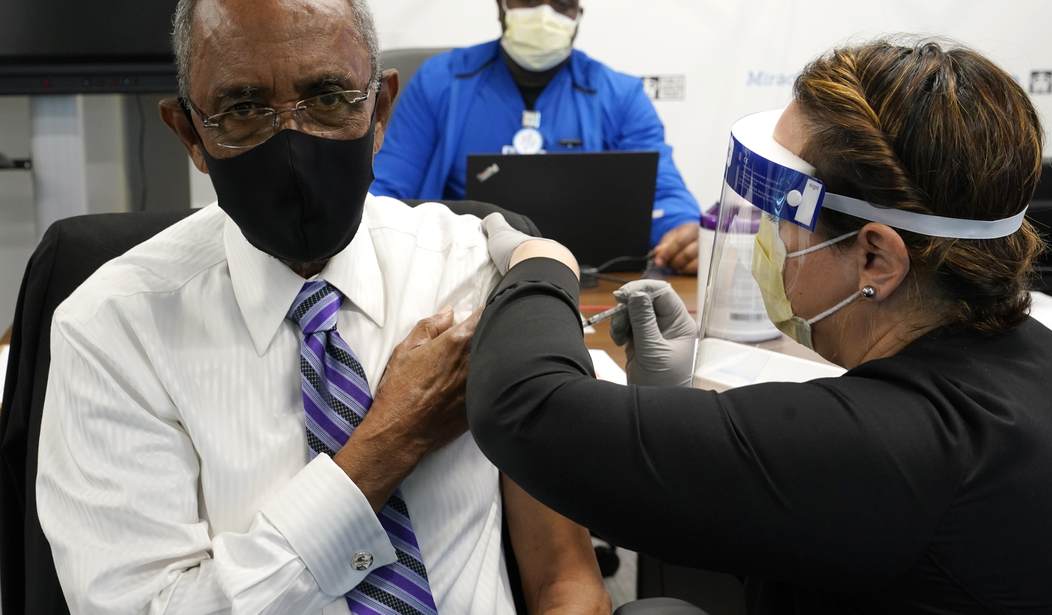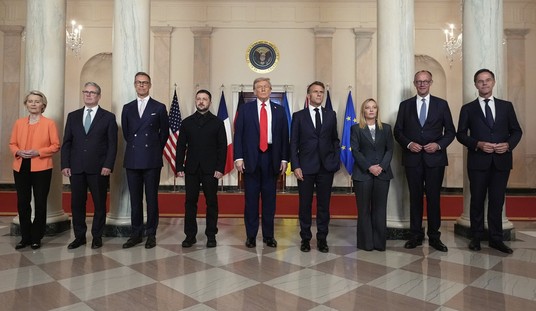I have a feeling the media’s going to turn this into a “politicians versus scientists” narrative, with Biden and his aides on one side barreling towards unnecessary third doses for political reasons and sagacious scientists on the other urging America to divert those doses to the third world, where they’re more urgently needed.
If that happens, remember that Anthony Fauci is a member of Team Booster, as are some other scientists like Eric Topol. Expert opinion is divided on this subject, not all on one side.
It’ll all come to a head when an FDA advisory board meets on Friday to discuss whether boosters should be authorized, just three days before Biden’s already announced launch date of September 20. Pfizer submitted data today from a small study showing that a third dose does provide some benefit. But the FDA is tipping its hand that it’s skeptical that the benefit is large enough to warrant an extra shot at a moment when the vaccines are holding up just fine against severe illness. Stat sees the showdown coming:
Food and Drug Administration scientists have expressed skepticism about the need for additional doses of Pfizer’s Covid-19 vaccine for all people who have received it.
The assessment by the agency’s staff, included in documents released Wednesday, sets up a high-stakes debate over who will need an additional booster dose — and when they will need it — at the meeting of experts being convened by the Food and Drug Administration on Friday.
In the documents, the FDA’s own scientists seemed to strike a cautious position about the need for widespread booster shots. Overall, they said, “data indicate that currently US-licensed or authorized COVID-19 vaccines still afford protection against severe COVID-19 disease and death in the United States.”
There are no less than three new studies flying around today on the efficacy of third doses, all part of a rush to have this information before the FDA huddles on Friday. The first comes from a trial conducted by Pfizer itself which showed that “levels of neutralizing antibodies against the Delta variant in a subgroup of trial volunteers were between five and seven times higher, roughly, than they were a month after the second dose.” Good news:

The Pfizer trial was small, though, just 300 people. And the number of subjects who were exposed to Delta was even smaller, just two dozen. The data did show, though, that immunity from infection waned significantly over time, from 93 percent one month after initial vaccination to 53 percent four months later. That’s a point in favor of boosting, even though Pfizer’s data shows that two doses continue to provide solid protection from severe illness months later.
But does immunity wane in everyone over time or just the old and immunocompromised? The second study comes from the UK and raises doubt about that. Click the images to enlarge the graphs:
First up, fresh data on protection against symptomatic infection. Key results:
• We knew protection started out lower among older groups. Now we know they also see the most waning
• Waning much more muted (if happening at all) among under-65s
• Moderna > Pfizer > AstraZeneca pic.twitter.com/N9JM2wlsKc— John Burn-Murdoch (@jburnmurdoch) September 15, 2021
And crucially, the study also breaks down protection against hospitalisation by underlying health conditions, which brings us to a key finding:
• Among those without severe comorbidities, there is actually very little waning against severe disease, if any. Both for Pfizer and AZ pic.twitter.com/ypyyxPJHPe— John Burn-Murdoch (@jburnmurdoch) September 15, 2021
Note the last tweet especially. There’s a solid case here for letting senior citizens and younger people with suppressed immune systems get a third dose ASAP. But where’s the evidence that anyone else will benefit meaningfully from a third shot?
That brings us to the third study, brand new from Israel. As you can see from the adjusted rate ratio here, Israelis who were boosted were at less risk of infection and at much less risk of severe illness after their third dose:

But there’s a catch — a big one. Since Israel only began giving out boosters six weeks ago, the researchers were necessarily limited in terms of how long they could track post-booster immunity. So they tracked it for 25 days. Look what happened after Day 21:

Three days of decline, then a strange sudden leap on the final day of the study. Were those three declining days outliers or was Day 25 the outlier, with immunity continuing to decline afterward?
To put that differently, is the enhanced immunity provided by boosters destined to last for only three weeks before it begins to wane again? Fauci has been touting a third shot lately as the key to potentially unlock durable immunity, the same way third doses of the HPV and Hepatitis B vaccines make immunity durable. The Israeli data raises the ominous possibility that the booster won’t do anything long-lasting, though. It may goose our immune system for a month or so and then we’ll be right back to where we are now, protected against severe illness but susceptible to infection and symptomatic disease.
What’s the use in that? Scientists are wondering:
“What I would predict will happen is that the immune response to that booster will go up, and then it will contract again,” said Marion Pepper, an immunologist at the University of Washington in Seattle. “But is that three- to four-month window what we’re trying to accomplish?”…
Therein lies the problem with the booster strategy, some scientists say: The tools to prevent hospitalization and death are already at hand. If the goal is to prevent infections, the nation will be stuck in a never-ending cycle of booster shots.
“If you really use infection as an outcome, you probably need a booster every six months, which is unrealistic and unattainable,” said Dr. Peter Chin-Hong, an infectious disease expert at the University of California, San Francisco. “I don’t care about symptomatic disease — I care about severe disease.”
Only Israelis over 60 are seeing a noticeable drop in protection from severe illness, which is a good reason to boost seniors but not an obvious reason to boost anyone else. One could argue that boosters are worth it if only to make people less infectious before the winter wave, which should reduce cases and transmission, but if the enhanced immunity from a boost fades quickly it’s unclear how much less infectious we’ll be. What if we all got boosted next week and were back to our current levels of immunity by Thanksgiving?
I don’t know that there’s any way out of this given the time frame we’re working within other than to recommend boosters for seniors and the immunocompromised (who are already eligible) and allow anyone else who wants to get one to do so. Then track everyone for six months and compare the unvaccinated, the vaccinated but un-boosted, and the boosted. We’re all part of one big ongoing clinical trial here to see if third doses provide durable immunity since the virus and the vaccines are each still too young to give us definitive answers. The only way to know is to do it and see. If immunity isn’t durable, then the eggheads can assess whether there’s any value to an annual booster in the fall or if the benefits are too fleeting to justify annual shots. But so long as there’s no risk of serious side effects from the third dose, what’s the argument for not going ahead with it and seeing what happens?









Join the conversation as a VIP Member